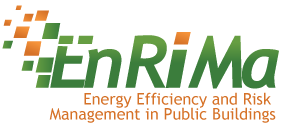Workflow
EnRiMa project was launched on the 1st of October 2010 and will run until the end of March 2014.
The project is split in nine workpackages:
- WP 1: Requirement analysis
- WP 2: Modelling energy flows
- WP 3: Scenario generation tool for energy prices and loads
- WP 4: DSS Engine for energy-efficient facilities under uncertainty
- WP 5: Seamless user interface for DSS
- WP 6: DSS at selected sites
- WP 7: Validation of benefits and costs
- WP 8: Dissemination and exploitation
- WP 9: Management and coordination
WP 1: Requirement Analysis
WP 1 will collect data, identify key uncertainties, evaluate market and regulatory environments, and assess ICT requirements at four test sites
WP 2: Modelling Energy Flows
WP 2 will map the dependencies of the energy flows from the test sites in order to create mathematical constraints based on energy transfer efficiencies that will be used in the stochastic optimisation to be developed in WP 4
WP 3: Scenario Generation Tool for Energy Prices and Loads
WP 3 will develop a scenario generation tool for energy prices and loads that will be used in WP 4. Upon completion, the tasks of WP 3 will enable Operational Objective O2 to be met
WP 4: DSS Engine for Energy-Efficient Facilities under Uncertainty
WP 4 will integrate the results of WPs 1, 2, and 3 into a model-based DSS Engine to be used through the user-friendly interface developed in WP 5 by decision-makers responsible for energy-efficient facilities operating under inherent uncertainties. Upon completion of the tasks in this WP, Operational Objective O3 will be met
WP 5: Seamless User Interface for DSS and Interaction with Enterprise Services
WP 5 will introduce the interfaces between the DSS Engine developed in WP 4 and the system human operators, i.e., the decision-makers responsible for energy-efficient buildings and areas of public use operating under inherent uncertainties. The Web-based user interface will also be properly developed, and new technologies facilitating rapid design and development of intuitive and user-friendly Rich Internet Services will be employed
WP 6: Test DSS at Selected Sites
WP 6 will test the DSS at the selected sites by taking into charge of the particularisation of generic platform components realised in WPs 3, 4, and 5 based on the requirements developed in WP 1. The major result of WP 6 consists in the validation of a pre-industrial prototype implementing a real-life application within an end-user organisation
WP 7: Validation of Benefits and Costs
WP 7 will use future scenarios and operator tolerances for risk and comfort to calculate metrics such as energy efficiency, expected energy costs, and CO2 emissions with and without the EnRiMa DSS. Thus, the benefits of the DSS will be quantified under various socio-economic outcomes in order to aid its transferability. Finally, what-if analyses and market surveys will provide insights into capacity expansion and potential adoption, respectively. Hence, WP 7 will result in the meeting of Operational Objective O5, i.e., to validate the DSS and to provide for its transferability via insights into the factors that are favourable to its adoption along with a preliminary market analysis
WP 8: Dissemination and Exploitation
WP 8 consists of activities aiming at communicating, integrating, sharing knowledge, and disseminating EnRiMa achievements to the target audience. Dissemination activities will allow to give more visibility to the project’s achievements in Europe
WP 9: Management and Coordination
The objective of WP 9 is to ensure the appropriate and timely implementation of the activities so that the consortium will reach the objectives of the project. Consequently, this WP will provide overall coordination in the administrative and technical aspects of the project





